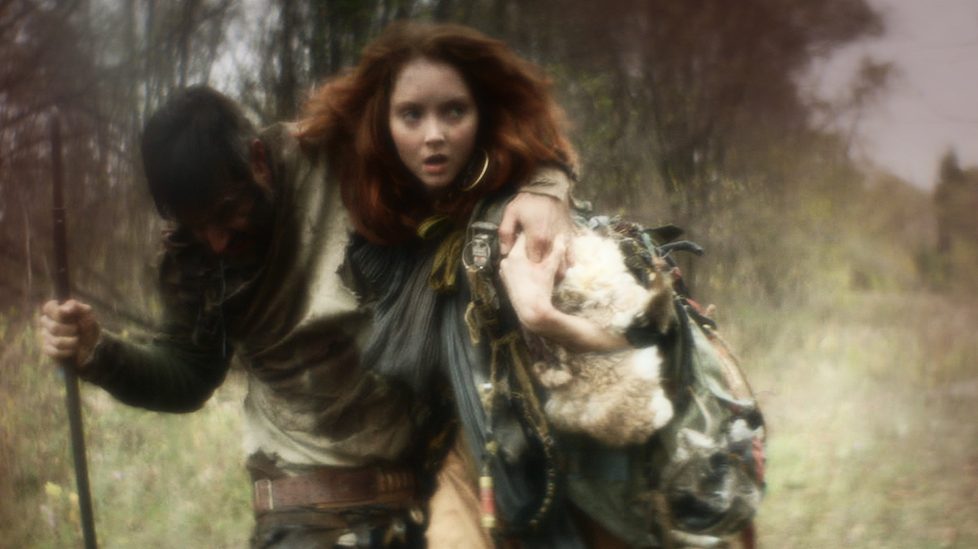ORION (2015)
In a desolate future, a wanderer fights to save a virgin mother from a powerful magician and locate a mythical city containing the world's last survivors.

In a desolate future, a wanderer fights to save a virgin mother from a powerful magician and locate a mythical city containing the world's last survivors.


The world of film is littered with post-apocalypses. Zombie-ravaged wastelands are ten-a-penny, and while Mad Max: Fury Road gave the genre a stylistic shot in the arm recently, many of these pictures have a broadly similar feel to them. Not so Asiel Norton’s Orion, which depicts a future world where more than civilisation fell apart… it seems the entire foundation of reality is now decaying.
Norton’s curious arthouse stylings deliver a film in which dialogue is sparse, and the plot is largely left for Tarot-themed title cards to explain, as the six chapters of the story unfold. Events take place a century after civilisation has collapsed, leaving a scattered few solitary souls to scavenge among ‘The Rust’. Over the decades, new prophecies have emerged, foretelling the coming of the legendary Orion (he of the constellation and Greek legend). One such scavenger (David Arquette) hears voices that suggest that he may be destined to become Orion himself. Could he be the Chosen One, or is he just insane? And where exactly do Lily Cole’s enslaved ‘Virgin’, and the arcane rituals of the terrifying and powerful ‘Magus’ fit in?
The visual palette of Orion is that of a jaundiced yellow, turning the environment almost unrecognisable. Sure, there are the ruins of old buildings, but this is a world that’s moved on in more fundamental ways than most post-apocalyptic stories. Where, say, The Road depicted a frighteningly plausible desolation that was all the more affecting for clearly being the ruins of our world, Orion’s wasteland feels like a deterioration of reality itself. A hellscape of the metaphysical.
The Hunter (as Arquette’s character is referred to) hears voices, while the magus really does have magical powers. He can shapeshift, for one thing, although don’t expect any CGI depictions of this. Concepts like science and language have been lost to history. Maren Lord’s ‘Fool’ is another curio; half feral, half ethereal, she’s another sign of the unreal half-madness of this world. The closest comparison piece might be Russian quasi-sci-fi Hard to Be a God, which also features a director’s defiantly chaotic vision and nauseous, swirling camerawork that help depict the panicky primitiveness of its broken world. (Or, in literary terms, M. John Harrison’s seminal Viriconium cycle)
Norton’s film is rich with mysticism, and layered with religious imagery, with many moments bringing to mind Christian iconography: from crucifixions and crowns of thorns, to a pregnant woman being led around on donkey-back, as if Bethlehem and the fabled inn were just around the corner. What you interpret from this—and, indeed, whether the frequent shots of Orion the constellation suggest an active, over-watching spirit, or a cold and indifferent pattern of distant stars—will vary from person to person.
Arquette has the least to do on the acting front, but embodies his Hunter with a tangible sense of fraying sanity, while Cole is nicely enigmatic as the Maiden, who also has a nice line in haunting lullabies (this recurring musical theme, along with the sound design in general, is brilliantly evocative). However, it’s Goran Kostic as the inscrutable and intense Magus who sticks in the mind; his uncanny and mysterious magician is genuinely unsettling at times, if only because he seems the most comfortable in this corroded world.
Orion is not a film that will work for everyone. The dreamlike sense of propulsion and the general weirdness of its atmosphere will render it a slog for those expecting clearer post-apocalyptic thrills. Orion is the kind of film you need to feel your own way through, rather than be led by the nose. And despite its sparsity of script, the world of Orion is so rich and immersive that for some it will be worth letting such a disorientating and contemplative vision wash over you.
writer & director: Asiel Norton.
starring: David Arquette, Lily Cole & Goran Kostic.
